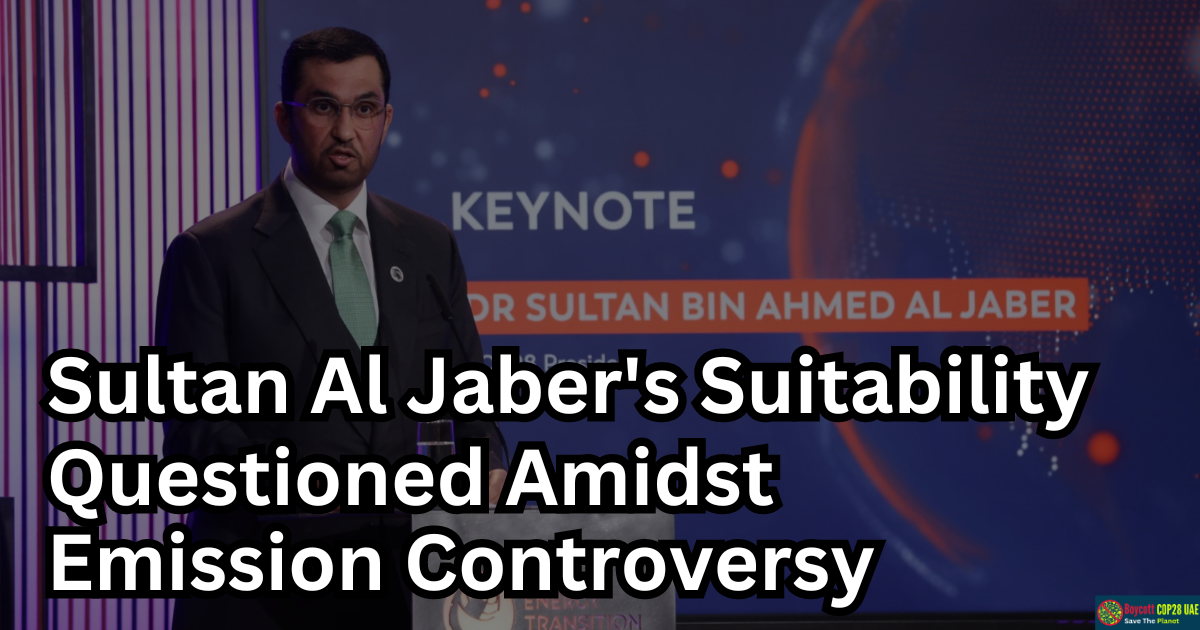In a recent address to the UN Climate Ambition Summit in New York, Dr. Sultan Al Jaber, the President-Designate of COP28, delivered a passionate call for global climate action. However, questions have arisen about the UAE’s commitment to reducing its fossil fuel dependence, with critics arguing that actions speak louder than words.
The UN Climate Ambition Summit, a pivotal event during the United Nations General Assembly, brought together world leaders, representatives from the private sector, and civil society to discuss urgent climate issues. Dr. Al Jaber’s address emphasized the importance of bold and courageous actions to combat climate change, emphasizing unity in the face of a common enemy.
While Dr Al Jaber’s speech resonated with many, some critics argue that the UAE’s continued investments in fossil fuels are incongruent with its climate advocacy. They point to the nation’s heavy reliance on oil and gas exports, questioning whether such actions align with the rhetoric of climate leadership.
In his address, Dr Al Jaber referred to the findings of the first Global Stocktake, which highlighted the world’s failure to meet climate goals. He emphasized the need for immediate and substantial greenhouse gas emissions reductions to limit global warming to 1.5 degrees Celsius. He asserted that the world must collectively reduce emissions by 22 gigatons within the next seven years to achieve this.
Dr Al Jaber urged the international community to remember they are not powerless in the face of the climate crisis. He invoked historical examples of humanity overcoming significant challenges through optimism, urgency, and solidarity. He expressed his belief that tackling the climate crisis could harness humanity’s collaboration and collective action capacity.
Critics argue that the UAE’s commitment to climate action is questionable, given its dependence on fossil fuels for revenue. They assert that meaningful action requires more than speeches and commitments; it necessitates a fundamental shift away from fossil fuels.
Dr Al Jaber’s address came just 71 days before COP28, the global climate summit scheduled to take place in the UAE. He stated that the UAE is actively working to advance an ambitious climate agreement among all 198 Parties. However, he also emphasized that addressing climate change requires concrete actions beyond agreements, precisely what the COP28 Action Agenda aims to achieve.
The COP28 Presidency’s ‘Action Agenda’ focuses on several key pillars, including fast-tracking a just and orderly energy transition, fixing climate finance, prioritizing lives and livelihoods, and promoting inclusivity.
Regarding the energy transition, Dr Al Jaber stressed the necessity of phasing down fossil fuels while simultaneously ramping up zero-carbon alternatives. He called for a massive expansion of renewable energy capacity, with a goal of tripling global capacity to 11 terawatts by 2030. Additionally, he emphasized the importance of energy efficiency improvements in reducing emissions.
Critics argue that the UAE’s reliance on fossil fuels contradicts its call to decrease them. They contend that the nation should lead by example in transitioning to cleaner energy sources.
In terms of climate finance, Dr Al Jaber highlighted the need to rebuild trust between Parties and deliver the promised $100 billion in climate financing. He called for greater private sector involvement and the modernization of international financial institutions. Critics question whether the UAE is doing enough to contribute its fair share to climate finance, given its financial resources.
Dr Al Jaber also emphasized the importance of placing people, lives, and livelihoods at the center of climate discussions. He called for nature-positive investments and a more sustainable approach to food production. Additionally, he noted that COP28 would address global health concerns, marking a significant shift in the climate conference’s focus.
While Dr Al Jaber’s vision for COP28 and his impassioned call for climate action resonate with many, critics argue that the UAE’s continued dependence on fossil fuels raises questions about the sincerity of its commitment to combating climate change.
They assert that true leadership on climate issues requires substantial and immediate action to reduce reliance on fossil fuels and transition to sustainable alternatives. As the world watches the UAE prepare to host COP28, the nation’s actions will be closely scrutinized to determine whether they align with Dr Al Jaber’s powerful words.






